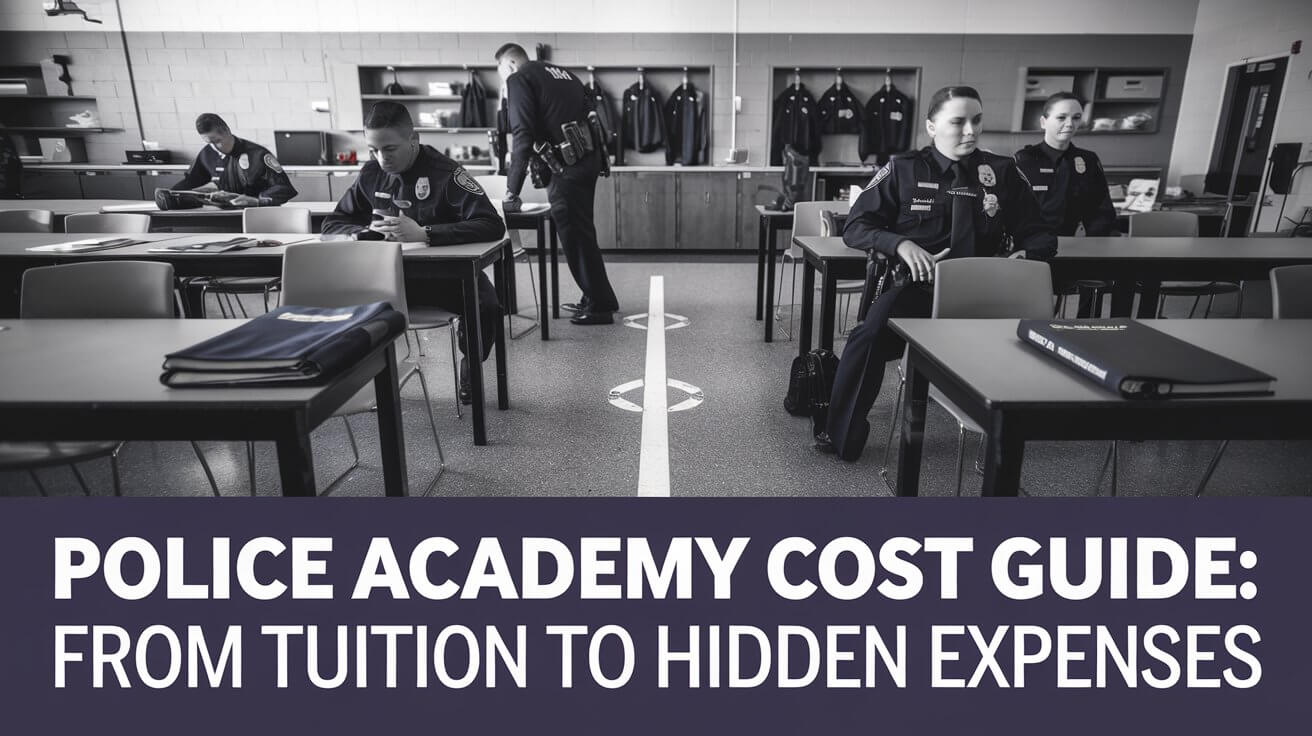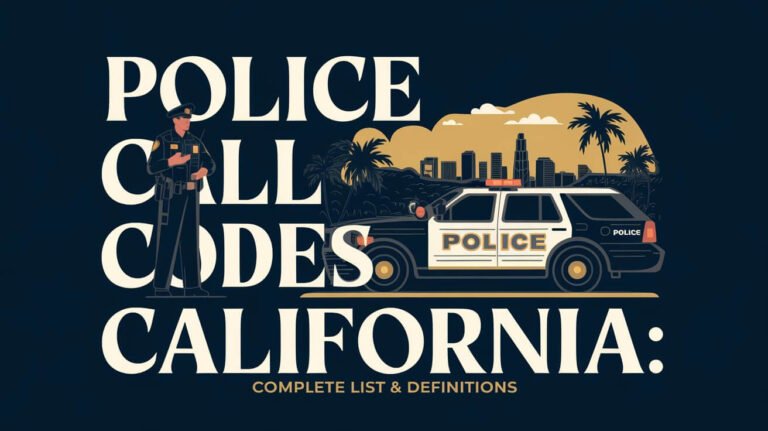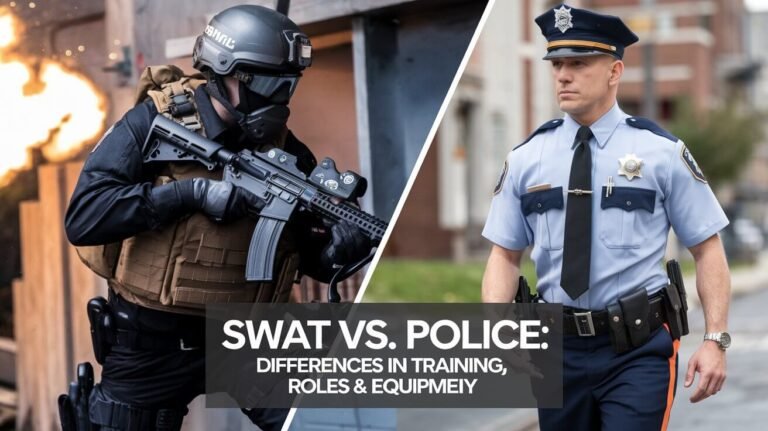Police Academy Cost Guide: From Tuition to Hidden Expenses

Pursuing a career in law enforcement starts with police academy training. The cost of police academy can range from $1,000 to $20,000 or more, depending on various factors. This guide breaks down the expenses, explores financing options, and helps you plan for your future in law enforcement.
Police academy training is the crucial first step for aspiring officers. It’s an investment in your future, but the costs can vary widely. Let’s dive into the details of police academy expenses, from tuition to hidden costs, and explore ways to manage them.
Police Academy Training
What is a Police Academy?
Police academies are specialized training facilities where recruits learn the skills needed for a career in law enforcement. These programs cover everything from physical fitness to legal studies, preparing cadets for the challenges of police work.
Duration of Police Academy Programs
Police academy programs typically last between 16 to 40 weeks. Some intensive programs may be shorter, while others extend up to a year. The length of training impacts the overall cost, so it’s important to consider when budgeting.
Breaking Down Police Academy Costs
Tuition Fees
Tuition is often the largest expense for police academy trainees. Costs vary significantly:
- Community college academies: $1,000 – $5,000
- State-run academies: $3,000 – $10,000
- Private academies: $10,000 – $20,000 or more
Remember, these are just averages. Some academies, especially those run by police departments, may offer free training for recruits they’ve already hired.
Equipment and Uniform Expenses
Police academy training requires specific gear:
- Uniforms: $300 – $500
- Boots: $100 – $200
- Duty belt and accessories: $200 – $400
- Firearm (if not provided): $500 – $1,000
Total equipment costs can range from $1,000 to $2,500. Some academies include these in tuition, while others require separate purchases.
Living Expenses During Training
Don’t forget about daily living costs during your training:
- Housing: $500 – $1,500 per month
- Food: $200 – $400 per month
- Transportation: $100 – $300 per month
These expenses can add up quickly, especially for full-time programs where working isn’t possible.
Factors Affecting Police Academy Costs
Location and Type of Academy
The cost of police academy training varies by location:
- Urban areas tend to have higher costs
- Rural academies may be more affordable
- State-run academies often offer lower tuition for residents
The type of academy also impacts costs:
- Agency-run academies may be free for hired recruits
- Private academies usually have higher tuition
- Community college programs often offer the most affordable options
Sponsored vs. Self-Sponsored Candidates
Sponsored candidates, hired by a police department before training, often have their academy costs covered. Self-sponsored candidates pay their own way, but may have more flexibility in choosing an academy.
State-Specific Requirements
Each state has unique requirements for police training:
- California requires 664 hours of training
- Florida mandates 770 hours
- New York calls for 700 hours
Longer programs generally mean higher costs, so check your state’s requirements when budgeting.
Average Police Academy Costs Across the United States
Regional Cost Variations
Police academy costs differ across regions:
- Northeast: $5,000 – $15,000
- Midwest: $3,000 – $10,000
- South: $2,000 – $8,000
- West: $4,000 – $12,000
These ranges account for tuition and basic equipment but may not include living expenses.
Case Studies: Specific Academy Costs
Let’s look at some real-world examples:
- San Diego Regional Public Safety Training Institute
- Tuition: $1,104 (California residents)
- Equipment: Approximately $2,000
- North Carolina Basic Law Enforcement Training
- Tuition: $1,216 (in-state)
- Equipment: About $1,135
- Florida Law Enforcement Academy
- Tuition: $3,400 – $5,000
- Equipment: $1,000 – $1,500
These examples show how costs can vary widely between states and programs.
Hidden Expenses in Police Academy Training
Physical Fitness Preparation
Getting in shape for the academy’s physical demands can incur costs:
- Gym membership: $30 – $100 per month
- Personal trainer sessions: $50 – $100 per hour
- Proper workout gear: $100 – $300
Medical Examinations and Background Checks
Pre-academy requirements often include:
- Physical exam: $50 – $200
- Psychological evaluation: $200 – $500
- Drug screening: $30 – $100
- Background check: $50 – $150
Licensing and Certification Fees
After graduation, you’ll need to budget for:
- State certification exam: $100 – $300
- Licensing fees: $50 – $200
These costs vary by state but are necessary to start working as an officer.
Financing Your Police Academy Education
Scholarships and Grants
Many organizations offer financial aid for aspiring officers:
- Law Enforcement Education Program (LEEP)
- American Criminal Justice Association Lambda Alpha Epsilon Scholarship
- Local police department scholarships
Research options in your area to find potential funding sources.
Student Loans for Police Academy
While less common for short-term programs, some financial institutions offer loans for police academy training. Federal student loans may be available if the academy is part of a degree program.
Agency Sponsorships
Many police departments sponsor recruits through academy training. This often covers all costs but requires a commitment to work for the sponsoring agency after graduation.
Return on Investment: Police Officer Salaries and Benefits
Starting Salaries for New Officers
Entry-level police officer salaries vary:
- National average: $55,000 – $65,000 per year
- Large metropolitan areas: $65,000 – $80,000+
- Rural areas: $35,000 – $50,000
Consider these figures when weighing the cost of academy training against future earnings.
Long-term Career Prospects
Law enforcement careers offer growth potential:
- Detectives and criminal investigators: $86,940 (median annual wage)
- First-line supervisors: $92,970 (median annual wage)
- Chiefs of Police: $100,000 – $200,000+ (depending on location and department size)
These figures highlight the long-term financial benefits of a police career.
Alternatives to Traditional Police Academies
Community College Programs
Many community colleges offer law enforcement programs that include academy training:
- Lower tuition costs
- Potential for financial aid
- Option to earn an associate’s degree
Online Training Options
Some states allow partial online training:
- Reduced costs for travel and housing
- More flexible scheduling
- Still requires in-person training for practical skills
Tips for Reducing Police Academy Costs
Early Preparation Strategies
Start preparing early to minimize costs:
- Begin physical training months in advance
- Save money for equipment and living expenses
- Research and apply for scholarships early
Seeking Sponsorships
Look for sponsorship opportunities:
- Apply to multiple police departments
- Consider committing to work in underserved areas
- Network with local law enforcement professionals
Frequently Asked Questions About Police Academy Costs
Is police academy always paid for by the hiring agency?
Not always. While many agencies cover costs for hired recruits, self-sponsored candidates pay their own way.
Can I work during police academy training?
It’s usually difficult due to the intense schedule. Some part-time programs may allow for work, but full-time academies typically don’t.
Are there age limits for police academy?
Most agencies require candidates to be at least 21, but some accept applicants as young as 18.
What happens if I fail out of the academy?
Policies vary, but you may have to repay training costs if sponsored by an agency. Self-sponsored candidates typically lose their investment.
Can GI Bill benefits cover police academy costs?
Yes, if the academy is part of an approved educational program. Check with your local VA office for specific details.
Conclusion
Embarking on a career in law enforcement requires a significant investment of time and money. Police academy costs can range from a few thousand dollars to over $20,000, depending on various factors. However, the long-term benefits of a stable career with growth potential often outweigh the initial expenses.
Plan for all police academy costs: tuition, equipment, living expenses, and hidden fees. Look into scholarships, loans, and agency sponsorships. Don’t just choose the cheapest option. Pick a program with quality training that fits your career goals.
The cost of police academy is an investment in your future. Careful planning and consideration of all factors will help you make an informed decision about pursuing a law enforcement career.






